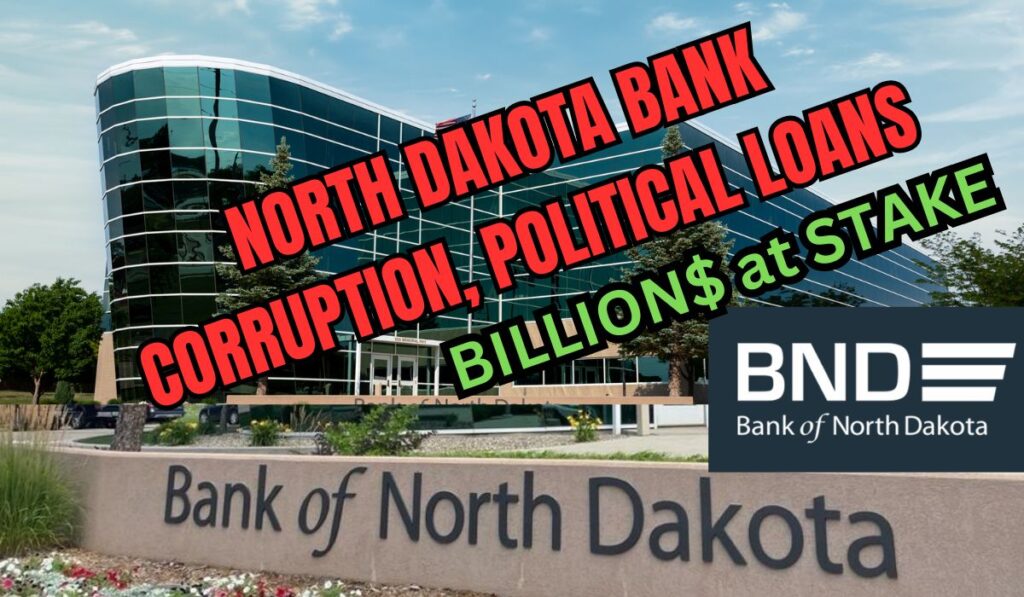North Dakota is unique in the United States for having its own state-run bank, the Bank of North Dakota (BND), which possesses over $10 billion in assets. This institution operates outside the purview of federal regulations, allowing it significant leeway in managing its financial operations, including loan approvals. The oversight of BND is limited to three key state officials: the Governor, the Attorney General, and the State Agriculture Commissioner, creating potential issues around accountability and transparency. Furthermore, all state-level public entities are mandated to maintain their deposits with the bank, resulting in a pool of ‘captive customers’ who depend on the bank for loan funding. However, a recent taxpayer-funded report raised concerns about the bank’s handling of these deposits, indicating that it has delivered subpar returns and incurred substantial bad debts amounting to approximately $475 million each year.
Experts claim that if BND were managed effectively and avoided making these bad loans, the resultant profits could contribute significantly to the state’s revenue from personal property taxes, potentially offsetting up to a third of this revenue stream. Such insights lead critics to suggest that the bank’s practice of purchasing bad loans from private financial institutions might encourage irresponsible lending behaviors. This practice raises fears that taxpayers may end up covering the costs of poorly constructed loans that benefit politically connected individuals or entities. An anonymous businessman in North Dakota described a pervasive culture of political pressure exerted on local banks, compelling them to align closely with BND, which could further the bank’s questionable lending motives and ethical concerns in the state’s financial ecosystem.
This troubling narrative of BND’s operational practices is further compounded by the political connections of individuals like Senator John Hoeven, a former president of the bank who has held multiple influential positions over the years. Critics point out that Hoeven’s relationships with local banks, including his position on the board of First Western Bank and Trust, may create conflicts of interest, particularly in legislation beneficial to his banking interests. The bank itself is shielded from many public disclosure requirements applicable to other governmental entities, and in 2023, an adverse opinion was issued by BND’s auditor, indicating noncompliance with U.S. Generally Accepted Accounting Principles (GAAP). This lack of transparency poses dangers both for public oversight and for the integrity of financial institutions operating within the state.
The quality of BND’s loan portfolio has come under scrutiny, with an alarming report indicating that nearly $2.5 billion in loans exhibit “the earliest signs of potential problems.” Critics of the bank have pressed for clarity on why approximately $1.5 billion worth of loans remain unrated in terms of risk, alongside distressing revelations concerning significant losses on securities and off-balance sheet risks like letters of credit and guarantees. Observers and critics of the bank suggest that its history includes troubled financial periods, with bailing out occurring previously using substantial funds from the American Rescue Plan Act (ARPA) in 2021. The bank’s reporting methods have been described as potentially obscuring substantial risks and operational irregularities, integrating a culture of silence amidst a complex political milieu.
Furthermore, this potential for abuse raises broader questions concerning the oversight exercised by state officials over the bank’s assets and influence over billions in private sector loans. Various scandals within North Dakota’s political landscape have also heightened concern about the ability of officials to manage sensitive financial matters. Notably, a cloud of controversy surrounds the unexpected deaths of several key figures related to the bank and state governance, culminating in speculation about the integrity of regulatory practices supported by the current leadership. Scandals, such as the troubling guilty plea of a former state senator on serious charges, add layers to public distrust, particularly regarding the entanglement of local government with the bank’s operations and the implications it has on state welfare and credibility.
Legislators, including Senator Weston, emphasize the need for a comprehensive review of the bank’s operations, particularly in light of reports suggesting the potential for over $9.5 billion in savings if state entities could manage their deposits outside of BND. These discussions highlight serious concerns that the current unfavorable performance of deposits may not only yield financial inefficiencies but also reflect systemic issues within the bank’s management framework, potentially draining state resources disproportionately. With concerns growing regarding accountability and the ethical implications of the bank’s lending practices, Senator Weston advocates for necessary control mechanisms, ensuring that the bank serves the interests of North Dakotans without undue influence based on political considerations or personal connections.
Despite requests for comments from the Bank of North Dakota, the institution declined to provide feedback on the unfolding controversies. The inquiries were redirected to the Industrial Commission, consisting of the Governor, Attorney General, and Agricultural Commissioner, which directs the bank’s activities. The complex interplay of politics, finance, and accountability embodied in BND illustrates the intricate challenges facing North Dakota’s state-run banking system and underscores the urgent need for transparency and regulatory reform to restore public trust in this unique financial institution. With the potential for long-lasting impacts on the state’s economy and political landscape, the situation demands rigorous scrutiny as North Dakota addresses its banking practices amidst evolving governance challenges.

